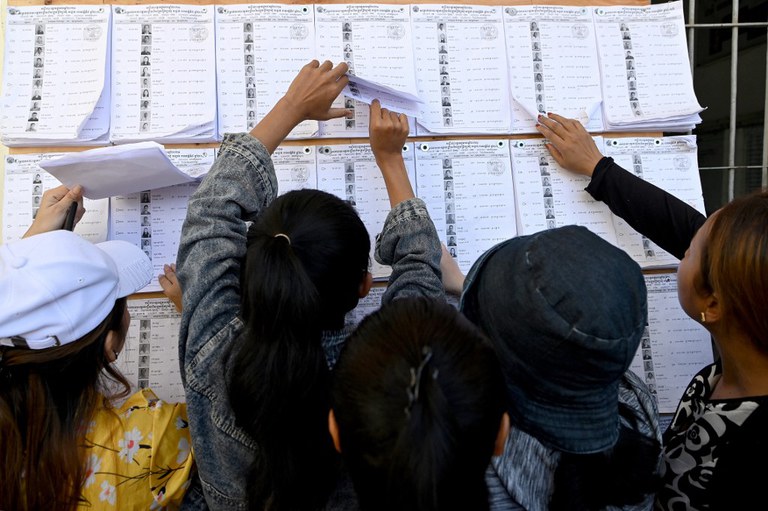Runaway inflation in Laos has caused prices of food, gas and other essentials to nearly double over the past year, some even within the last month, sources in the country told RFA. Inflation in the country is closely related to the value of the kip relative to other currencies, due to the country’s heavy reliance on imports for most of its consumer needs. On Friday, U.S. $1 equaled about 13,950 kip, compared with 9,420 kip a year ago, for a depreciation of about 48%. The sudden rise in food prices is making life difficult, sources told RFA. “On Saturday, May 28, 2022, I gave 2,000 kip [$0.50] to my 12-year-old son to go to buy some eggs from a nearby store for his lunch,” a mother in the capital Vientiane, who like all other unnamed sources in this report, requested anonymity for security reasons, told RFA on Tuesday. “At first, I thought that with the 2,000 kip, my son would be able to buy two eggs. But, when he arrived home with only one egg, I was surprised that the price of an egg has now doubled since late last year,” she said. Six months ago a pack of instant noodles in Vientiane’s Hatxayfong district cost 20,000 kip, now it costs 40,000, a resident there told RFA. “The price of everything is doubling,” she said. Pork in Pakse, a city in the southern province of Champassak, now costs 55,000 kip a kilogram (2.2 pounds), up from 30,000 kip, a resident said. “Food prices are going up every day. The government must solve the problem,” the person said. According to data from the Lao Statistics Bureau and RFA Lao, in just the past month, the cost to buy rice, beef, pork or eggs has significantly increased. Eggs have doubled in price. Inflation is not limited to food. The price of gas rose for the 13th time this year on June 1, according to the Lao Ministry of Industry and Commerce. Regular unleaded gas increased from 23,770 kip per liter ($6.46 per gallon) to 28,070 per liter ($7.64/gallon) Gas prices are so high that “a lot of people go across the Mekong River to visit [Thailand] and buy cheaper gas and other consumer goods,” a motorist in Vientiane told RFA. “We have to adjust ourselves to the new normal, in other words to change our lifestyle,” Another motorist told RFA “For example, I drive my car only when it’s very necessary and I sometimes drive to Thailand to buy cheaper gasoline, vegetable oil, fish sauce and other food items.” A gas station owner in Thailand verified the trend. He told RFA that two weeks ago he noticed a sharp increase in customers from Laos. “Most of them buy consumer goods and fill their vehicle tanks with gasoline on their way back home,” he said. Public transportation costs are also rising. “Starting June 1, 2022, a Laos-China train ticket to the capital Vientiane will be 242,000 kip at the sale office counter and 262,000 kip at stores, up from 198,000 kip,” a ticket seller in Luang Prabang City, Luang Prabang Province, said. Train fares are out of reach for most people, a villager in the northern province of Luang Prabang told RFA. “Most people are suffering from severe gas shortage and inflation, and now there are high train fares too,” he said. “I want to see lower prices because everything is going up. Farmers in Laos have had to deal with a double-whammy of inflation and shortages of some products required to do their work. The combination has delayed plowing in the southern province of Attapeu, a provincial official told RFA. “These farmers are poor and unable to afford gas. They just sit and wait for gas prices to come down,” he said. Small businesses are also suffering in the harsh economic climate, a Vientiane businessman told RFA. “One half of all SMEs [small-to-medium enterprises] are dead. They can’t survive the high gas prices and lack of business. The other half is struggling.” The World Bank reported that inflation in Laos jumped to 9.9% in April this year from only 2% in January 2021. The bank recommended that the country stabilize the kip, push for more agricultural production, work to attract more investment and create more jobs. A Lao financial expert told RFA that the country must change how its economy has operated to survive. “One of the solutions would be that we should import fewer goods. We can’t afford to buy as much as before because we have less foreign money,” he said. “The other solution would be that we produce more domestically.” Sonexay Sitphaxay, governor of the National Bank of Lao P.D.R., told reporters on May 27 that the government was trying several approaches to solve its problems. “[We] are attempting to divert foreign currencies into the banking system from black market, punish money exchangers and manipulators, reduce the impact of inflation on society, negotiate with trade partners and convince them to accept the kip, and reduce the need of foreign currencies,” he said. An economist told RFA, “First for most, the government should stabilize the kip, increase foreign currency reserve and expand economy in a sustainable way.” But the recovery for Laos will take time, an Asian Development Bank employee said. “[It] is going to be slow this year and in the next several years because of COVID-19, the stronger U.S. dollar and the crisis in Ukraine,” he told RFA. “While the buying power of Laotians is lower, the Lao economy may start up again in 2-3 years.” Translated by RFA’s Lao Service. Written in English by Eugene Whong.






